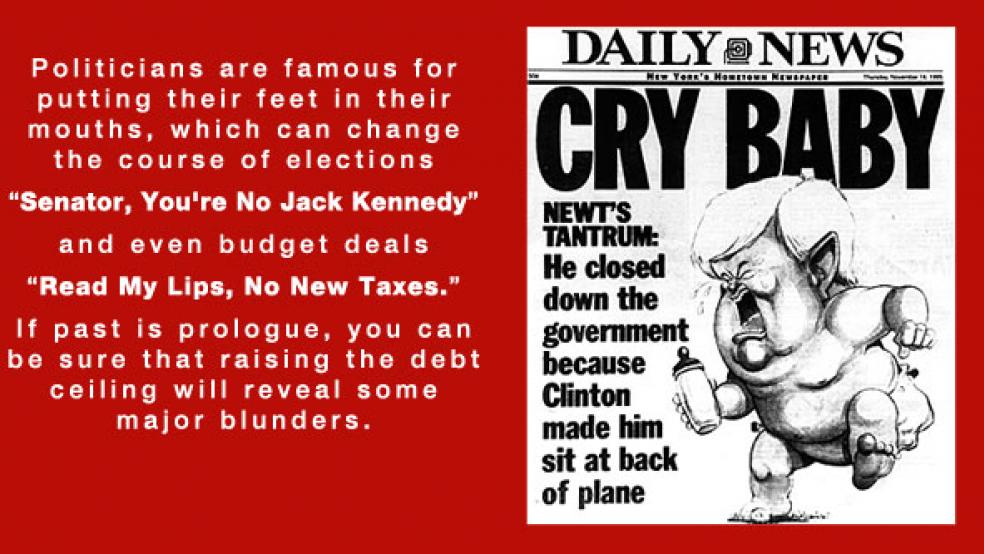As the Senate “Gang of Six” and Vice President Biden’s “Gang of Seven” try to negotiate a major deficit reduction and debt ceiling deal, it’s wise to keep in mind the many epic budget negotiations that came before. These talks stretch back in time to the early Reagan administration, and addressed everything from how best to preserve Social Security to how to whittle down the deficit or even balance the budget.
While many of these talks produced positive results, nearly all of them were marred by political or strategic blunders that either undercut the negotiations or gave an unintended victory to the other side.
Based on a review of the annals of these budget summits and interviews with fiscal experts and scholars, here is The Fiscal Times list of the top Five Budget Blunders and Obstacles:
1. The “Read my lips, no new taxes” fiasco. When President George H.W. Bush uttered those words in his acceptance speech at the Republican national convention in 1988, he might as well have kissed a second term goodbye right then and there. Bush was anticipating a showdown with congressional Democrats over the deficit, and he saw the need to draw a bright line in the sand against any tax increase, to placate the conservative wing of his party. But Rule No. 1 for budget talks is don’t box yourself into a corner with promises you may not be able to keep.
In a bid to get talks with Democratic leaders off the dime in 1990, Bush broke his pledge in a famous statement issued during a budget summit held at Andrews Air Force Base, by saying he would go along with “revenue enhancements” in an effort to cut the deficit. The euphemism didn’t help. The summit ended after ten days with no agreement, and Bush lost his reelection bid.
2. The “Cry Baby Newt” episode. There’s no question that big egos can get in the way. Former House Speaker (and now presidential candidate) Newt Gingrich learned that lesson the hard way back in November 1995 when he fumed over being let out the back door of Air Force One after a trip to Israel (famously caricatured by the New York Daily News “Cry Baby” headline). He turned his pique on budget talks with the Clinton administration and triggered a government shutdown by refusing to compromise. The public largely blamed the Republicans, President Bill Clinton emerged as the winner, and Republicans paid for it in the next elections. (Note to new candidate Gingrich: You’ve said a government shutdown could be played to the Republicans’ advantage this time around. History would indicate otherwise.)
3. The politically disastrous “BTU incident.” Back in 1994, President Clinton and Democratic leaders of the House persuaded rank and file Democrats to to approve a new energy tax, dubbed a “Btu tax,” for British Thermal Unit, the measure of energy. House Democrats were highly reluctant to support the unpopular tax increase as part of a budget plan, but the White House twisted their arms. But then Clinton turned around and negotiated a deal with the Democratic Senate to scrap the Btu tax, which left the House Democrats hanging out to dry. The Democrats lost the House in the 1994 elections.
Moral: To avoid “getting BTU’d,” weigh the political consequences before you vote. (Note to House Republicans who reluctantly supported a GOP budget plan last month that would drastically change Medicare and Medicaid but is going nowhere in the Senate: Were you BTU’d?)
4. The dramatic gesture that flopped. Sometimes a bold move by a politician can capture the public’s imagination and turn the political tide. Back in 1986, the Republican-controlled Senate passed a budget that called for temporarily scrapping cost-of-living increases for Social Security beneficiaries as well as some defense spending cuts. Then-Sen. Pete Wilson, R-Calif., recovering from an appendectomy, was wheeled into the chamber on a gurney in a midnight vote to break a 49-49 tie and pass the budget. But Wilson’s gutsy move was all for naught.
The Democratic-led House passed a dramatically different budget and conferees could not agree. In the end, President Ronald Reagan got cold feet about the COLA freeze and struck a deal with then-House Speaker Tip O’Neill that sacrificed deficit reduction, allowed the COLA, and restored defense spending. Republicans in the Senate were furious, and Democrats took over in the 1986 elections.
5. The curse of extraneous issues. Regardless of how lofty the goals of deficit reduction negotiations, invariably extraneous issues will crop up that sidetrack or threaten the talks, just as spending for Planned Parenthood almost derailed last month’s talks between President Obama and the Republicans over the fiscal 2011 budget. Issues ranging from abortion services to public television to charter school funding in the District of Columbia have thrown a monkey wrench into budget talks in the past.
A little history is instructive. When then-House Ways and Means Committee Chairman Dan Rostenkowski, D-Ill., pushed through a major tax reform and deficit reduction bill in 1986, he actually set aside several billion dollars in special extraneous tax breaks to entice House members to vote for the overall tax bill. He sat in the library doling out favors – some might say literally “buying” votes – with the tax breaks.
It might be unseemly – but it worked.
Related Links:
Washington’s Budget Blunders (Daily Caller)
GOP’s Budget Woes Mirror Clinton Missteps (LA Times)

